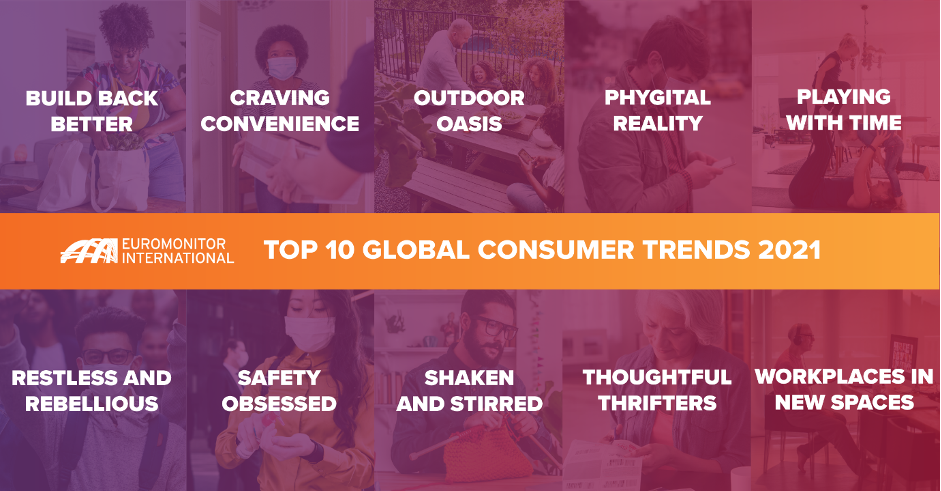COVID-19 affected us all in 2020 and we acclimatised. Emerging habits accelerated, and how we behave, spend and consume will never be the same. The pandemic created, influenced and accelerated some of the biggest trends this year and Euromonitor International has identified the top ten trends expected to gain traction in 2021.

Build Back Better
In this first trend, consumers are demanding that companies care beyond revenue; they no longer perceive businesses as profit-driven entities. Protecting the health and interest of society and the planet is the new expectation, in order to Build Back Better. Companies should help reshape the world in a more sustainable way, leading a shift from a volume- to a value-driven economy and turning the tide on social inequity and environmental damage.
Craving Convenience
Consumers are craving the convenience of the pre-pandemic world, longing for the ease taken for granted before daily habits were upended. Businesses are under pressure to rapidly adapt their operations to develop a resilient customer experience while maintaining convenience. Companies must preserve the swift and seamless shopping journey across all channels.
Outdoor Oasis
Health threats, indoor meeting and mobility restrictions and the rise of remote working results in consumers turning to an Outdoor Oasis for leisure and recreation. Some are even considering moving from densely populated cities to rural areas. Businesses incorporated advanced health measures and moved events outside, allowing consumers to reconnect out of the home more safely. Companies should pivot their product development strategy to encompass the tranquillity of rural living in urban environments to better satisfy city-scapers.
Phygital Reality
Phygital Reality is a hybrid of physical and virtual worlds where consumers can seamlessly live, work, shop and play both in-person and online. Digital tools allow consumers to stay connected while at home and re-enter the outside world safely as economies reopen. Businesses can integrate virtual processes into their physical spaces to give consumers who prefer to stay home the comfort to venture out instead. Delivering virtually enabled at-home experiences remains imperative to drive e-commerce sales and gather data.
Playing With Time
Consumers are now both able and forced to be more creative with their time in order to get everything done. Businesses should provide solutions that address the consumer desire to maximise time, offering increased flexibility, especially with products and services that can be accessed from or near the home.
Safety Obsessed
Safety Obsessed is the new wellness movement. The fear of infection and increased health awareness drive demand for hygiene products and pushes consumers towards contactless solutions to avoid exposure. Companies should implement enhanced safety measures and innovations that target concerns to reassure consumers.
Shaken and Stirred
The global pandemic reconfigured daily lives, testing mental resilience, restricting experiences and provoking economic shocks. Consumers have a new understanding of themselves and their place in the world in pursuit of a more fulfilled, balanced and self-improved life. Businesses must provide products and services that support resiliency for mental wellbeing and to help Shaken and Stirred consumers weather adverse circumstances.
Thoughtful Thrifters
Consumers are cautious and frugal. Discretionary spending is declining due to the uncertain economic environment. Thoughtful Thrifters are prioritising value-added and health-conscious products and services. Companies should pivot towards value for money propositions, offering affordable options without sacrificing quality. Premium attributes should be reinforced with a new empathetic story and have a strong tie-in with health and wellness, self-care or mental wellbeing.
Workplaces in New Spaces
Out of office took a new meaning in 2020. Workplaces in New Spaces had a rippling effect on consumer life, from clothing choices to technology spend to eating habits and beyond. Consumers are searching for new ways to define the beginning and end of their workdays, as they struggle to manage their time. Businesses must support work-life balance, productivity and communication needs. Understanding the benefits and challenges of working remotely allows companies to bring the best of the office into the home.
How should companies respond?
Given the long-lasting changes to consumer behaviour as a result of the COVID-19 pandemic, pinpointing these trends has never been more important for businesses.
Brands should focus more than ever on affordable, value-added products and services. Just as consumers have had to reimagine their homes to be more multifunctional, brick-and-mortar stores must reimagine their physical spaces to accommodate new ways of doing business while providing the safety and convenience consumers desire.
Investing in technology and virtual experiences is critical to facilitate engagement with consumers both online and in person. Purpose-driven initiatives will resonate with consumers in 2021. Amidst social unrest, consumers want the facts and expect brands to act. Communicating with compassion and supporting mental wellbeing are critical attributes to drive brand loyalty.
For further insight on these trends, download a complimentary copy of Euromonitor International’s report Top 10 Global Consumer Trends.


